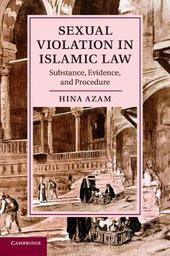
|
Sexual Violation in Islamic Law: Substance, Evidence, and Procedure
Paperback / softback
Main Details
| Title |
Sexual Violation in Islamic Law: Substance, Evidence, and Procedure
|
| Authors and Contributors |
By (author) Hina Azam
|
| Series | Cambridge Studies in Islamic Civilization |
|---|
| Physical Properties |
| Format:Paperback / softback | | Pages:284 | | Dimensions(mm): Height 230,Width 153 |
|
| Category/Genre | Islam |
|---|
| ISBN/Barcode |
9781107476066
|
| Classifications | Dewey:345.16702532 |
|---|
| Audience | | Professional & Vocational | |
|---|
|
Publishing Details |
| Publisher |
Cambridge University Press
|
| Imprint |
Cambridge University Press
|
| Publication Date |
27 July 2017 |
| Publication Country |
United Kingdom
|
Description
This book provides a detailed analysis of Islamic juristic writings on the topic of rape and argues that classical Islamic jurisprudence contained nuanced, substantially divergent doctrines of sexual violation as a punishable crime. The work centers on legal discourses of the first six centuries of Islam, the period during which these discourses reached their classical forms, and chronicles the juristic conflict over whether or not to provide monetary compensation to victims. Along with tracing the emergence and development of this conflict over time, Hina Azam explains evidentiary ramifications of each of the two competing positions, which are examined through debates between the H anafi and Ma liki schools of law. This study examines several critical themes in Islamic law, such as the relationship between sexuality and property, the tension between divine rights and personal rights in sex crimes, and justifications of victim's rights afforded by the two competing doctrines.
Author Biography
Hina Azam is an Assistant Professor of Middle Eastern Studies at the University of Texas, Austin. She has published articles in the Journal of Law and Religion, the Journal of Middle East Women's Studies, and Comparative Islamic Studies. She has contributed to the edited volumes Feminism, Law, and Religion (2013) and A Jihad for Justice: Honoring the Work and Life of Amina Wadud (2012), as well as to The Oxford Encyclopedia of Islam and Law (forthcoming).
Reviews'In Sexual Violation in Islamic Law, Hina Azam combines meticulous attention to formative and classical Hanafi and Maliki jurisprudence with incisive analysis of their implications for contemporary Muslim laws surrounding sexual violence. This groundbreaking study is essential reading for scholars of Islam, law, and gender.' Kecia Ali, Boston University 'Hina Azam's careful analysis of various doctrines of Hanafi and Maliki fiqh have led to important insights regarding deep philosophical differences separating the two schools with respect to sexuality, gender, and violence. By integrating conceptions of gender, property, and theology, Professor Azam has produced a compelling narrative that is not only powerful as an interpretive heuristic, but one that also opens new avenues for research and serves as a model for how gender studies and Islamic law should be conducted by future researchers.' Mohammad Fadel, University of Toronto 'Hina Azam's meticulous readings of classical texts are framed in a wide-ranging analysis with implications far beyond the issue of sexual violence. Although firmly centered on pre-modern legal discourses, the book trenchantly demonstrates their relevance to ongoing debates. Required reading for anyone interested in the history of gender and Islamic law.' Marion Katz, New York University 'Hina Azam's book is a tour de force on the early history of sexual violation in Islam. Debates on penalties attached to crimes of rape in some contemporary majority Muslim societies are derived from early Islamic precedents and practices. Prior to Sexual Violation in Islamic Law some of these debates were shrouded in arcane debates and unreachable texts for many. In lucid prose and elegant presentation, Azam provides an accessible historic overview of internal debates among legal scholars that are now available to the broader reading public. Her vital insights will cast a guiding light for those interested in debates on gender, sexuality, and ethics as well as the sexual practices in the Near East in a comparative context.' Ebrahim Moosa, University of Notre Dame, Indiana 'Hina Azam takes on contemporary practices of Islamic law that work against rape victims through a revisiting of late antique and medieval legal discourses. Her meticulous approach yields ample material for rethinking some of the more injurious aspects of current legal interpretations and sounds a compelling call for gender justice grounded in the Islamic legal tradition. An exemplary work of engaged scholarship.' Judith Tucker, Georgetown University, Washington DC
|